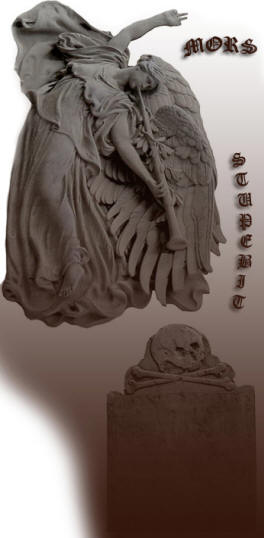|

When tomorrow never Came
Mors Stupebit
(Death has Struck)

“Vidi
impium superexaltatum, et elevatum sicut cedros Libani; et transivi,
et ecce non erat; et quaesivi eum, et non est inventus locus ejus.”
(Psalm 36.35-36)
“I
have seen the wicked highly exalted, and lifted up like the cedars
of Lebanon.
And I passed by, and lo, he was not: and I sought him and his place
was not found.”
You
have already heard that sonorous sound
as of a distant trumpet. It is
indistinct, distant, and carries a somber note that every man who has
ever lived has heard. For some it is an ominous bray, immeasurably deep,
tremulous and harsh, muted only by the depths of earth through which
it breaks in subtle fissures leaving graves quivering in anticipation.
It strikes the lowest chords in the human
heart and is ancient beyond the sum of all years.
You do not hear it with your ears but
with the deepest listening in your being. It somehow resembles the final
muttering of thunder in a vast distance that reverberates through the
earth. It is a call, you realize, of something to come.
It resonates in the darkest chambers of
your soul. It is primeval. Instantly you understand it as a prophetic
summons.
It percolates through every
language of man and is comprehensible to all:
It is
alternately a prophesy, a promise, a hope, or a threat, and all are
unmistakably certain: “You
will die.”
Have you begun vainly reflecting upon
your
“mark
in the world”
— how
“the
world will remember you”
— in that tomorrow that, one day, will not come for you?
Such vanity! Why would it matter — and within three generations,
to whom? You esteem yourself far more than you should.
Most of us — the vast majority
of us — are not momentous figures in the annals of history, and even
were we, we would never know, being dead. What is more, the world will
end, and with it, all remembrance of the famous and the infamous ...
and of us. It is of no significance to be remembered by the
world after we are dead — but it is of the
greatest
significance to be known by God,
and to never hear those terrible words that will be uttered by Christ
to many, sorrowfully, in the Last Judgment: “I never knew you: depart
from Me” (Saint Matthew 7.22).
The very ancient Sequence Dies Irae
(Day of Wrath) which was sung for centuries in the Requiem Mass, or
Mass for the Dead (Missa
pro defunctis) describes this judgment succinctly in the fourth
and sixth stanzas:
|
Mors
stupebit et
natura,
Cum resurget creatura,
Iudicanti responsura.
|
Death
is struck,
and nature quaking,
All creation is awaking,
To its Judge an answer making.
|
|
Judex
ergo cum sedebit
Quidquid latet apparebit:
Nil inultum
remanebit.
|
When
the Judge His
seat attains
And each hidden deed arraigns
Nothing unavenged remains.
|
What, then,
will you say? What answer will you give?
It is worth reflecting
upon — while yet we can.
Editor
Boston Catholic Journal
 Printable PDF Version
Printable PDF Version

Totally Faithful to the Sacred
Deposit of Faith entrusted to the Holy See in Rome
“Scio
opera tua ... quia modicum habes virtutem, et servasti verbum
Meum, nec non negasti Nomen Meum”
“I
know your works ... that you have but little power, and
yet you have kept My word, and have not denied My Name.”
(Apocalypse
3.8)
Copyright © 2004
- 2024 Boston Catholic Journal. All rights reserved. Unless
otherwise stated, permission is granted by the Boston Catholic
Journal for the copying and distribution of the articles
and audio files under the following conditions: No
additions, deletions, or changes are to be made to the text
or audio files in any way, and the copies may not be sold
for a profit. In the reproduction, in any format of any
image, graphic, text, or audio file, attribution must be
given to the Boston Catholic Journal.
|
|






















